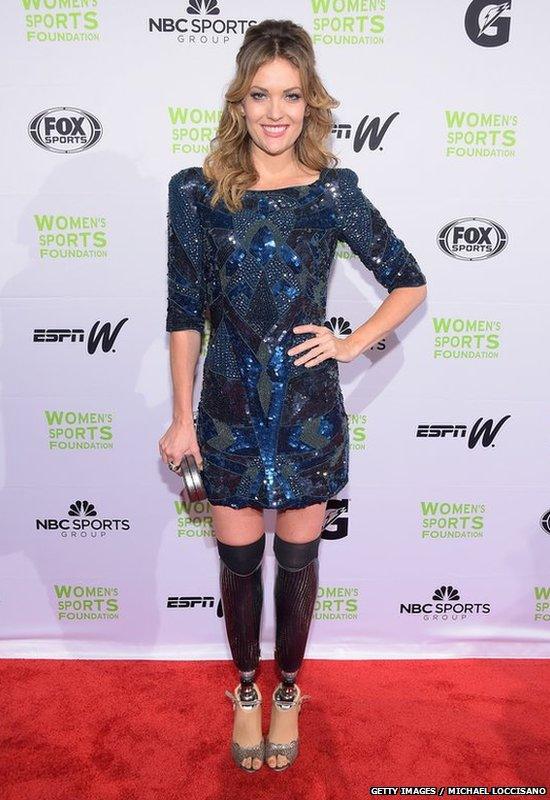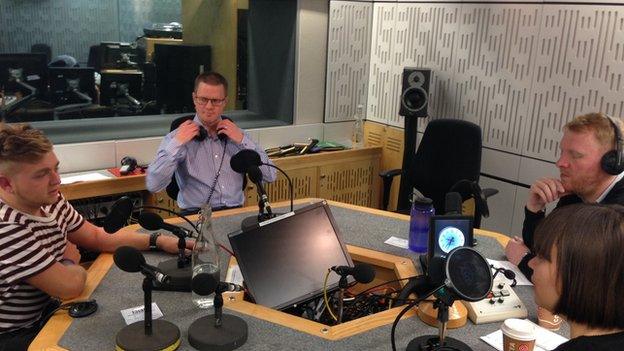Is it OK to call disabled people 'inspirational'?
- Published

Snowboarder Amy Purdy featured in a Super Bowl ad - but some critics called it "inspiration porn"
Two big Super Bowl advertisements have touched off the latest debate about whether disabled people can be "inspirational" for doing everyday things - or if the tag is condescending.
During the American football festivities earlier this month, Paralympian Amy Purdy ran, snowboarded and danced, external for Toyota, while Microsoft showed off how its technology helps a six-year-old boy with prosthetic legs, external. And those certainly aren't the only attention-grabbing videos featuring disabled people. BBC Trending recently covered the story of Madison Tevlin's rendition of "All of Me", external which has now been watched more than 6m times.
The term "inspiration porn" was brought to the mainstream by the late Australian comedian Stella Young, and Trending radio brought together two disabled bloggers to debate the adjective. Is it OK to be "inspired" by disabled people - and is the "inspiring" tag encouraging or offensive?
Charlie Swinbourne, blogger at limpingchicken.com, external: It's wrong to use disabled people to provoke strong reactions

Charlie Swinbourne
The thing I feel troubled about is that words like "inspiring" are a product of low expectations of disabled people. And I think there's a lot of positives within Madison Tevlin's video. But often - and the Super Bowl adverts were an example of this - disability is used as a kind of hook to tell the story of achieving despite the odds, a Hollywood story. People aren't looking at a more complex, nuanced picture of what disabled lives are like. It does make people look at disability in a positive way, but I think what I have a problem with is disability being used as a way to create a reaction in non-disabled people.
I'm partially deaf, and I object to formulaic use of disability to create a response. Often people look at disability as something to overcome, and if you overcome that, everything will be OK. I think that's very concerning.
I think there's an issue with the polarisation of how disabled people are seen - either you've got the highest achievers or you're seen as a scrounger who's taking something from society, and the reality is almost everybody is neither of those things.
Melissa Finefrock, blogger at hopeburnsblue, external: I now realise that everyone has their own reasons for being 'inspired'

Melissa Finefrock
Sometimes people would just walk up to me and just say "you're inspiring". I might be crossing a street and someone might walk up to me and say "you're inspiring" - I'm blind. At the time I was busy being annoyed because that's what I was taught to be.
But once I fell on train tracks and I almost died. I busted up my leg and I was depressed and I had to find inspiration anywhere I could. I realised that sometimes people have stories behind why they're inspired that we couldn't possibly guess at.
It's language. Maybe people are impressed by how I navigate or they're intrigued by the adaptive technology I use. I think people resort to this concept of "inspiration" to put one word on it. What they're coming away with is still positive. And it's good that people are seeing us in a positive light, because just decades ago nobody expected anything of us.
Trending is on BBC World Service radio at 10:30 GMT on Saturdays and you can put us in your pocket and listen anytime by downloading our free podcast.
More blog posts:
Should Jon Stewart and Brian Williams swap jobs?
The case for a non-white Spider-Man
Follow BBC Trending on Twitter @BBCtrending, external. All our stories are at bbc.com/trending
- Published18 November 2014
